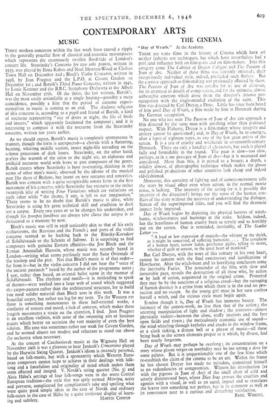CONTEMPORARY ARTS
MUSIC
THREE modern concertos within the last week have caused a ripple in the generally peaceful flow of classical and romantic masterpieces which represents the enormously swollen flood-tide of London's concert life. Stravinsky's Concerto for two solo pianos, written in 1935, was played by Ilona Kabos and Noel Mewton-Wood at Chelsea Town Hall on December 2nd ; Bloch's Violin Concerto, written in 1938, by Jean Poug,net and the L.P.O. at Covent Garden on December ist ; and Bartok's Third Piano Concerto, written in 1945, by Louis Kentner and the B.B.C. Symphony Orchestra at the Albert Hall on November 27th. Of the three, the last written, Bartok'a, was the most easily assimilable at a single hearing—possibly a mere coincidence, possibly a hint that the period of extreme experi- mentalism in music is coming to an end. The Andante religioso of this concerto is, according to a pupil and friend of Bart6k, a kind ot nocturne representing "out of doors at night, the life of birds and insects," which apparently fascinated the composer ; and it is interesting to compare it with the nocturne from the Stravinsky concerto, written ten years earlier.
As we should expect, Bartok's music is completely spontaneous in manner, though the form is unexpected—a chorale with a fluttering, buzzing, whirring middle section, insect night-life intruding on the solemn procession of dark hours. Stravinsky, on the other hand, prefers the warmth of the salon to the night air, an elaborate and artificial nocturne world with bows to past composers of the genre. Burt& creates where Stravinsky is busy re-creating, thinking in the terms of other men's music, obsessed by the idioms of the musical past like those of Brahms, but intent on new textures and sonorities. Bartok was content with a quite recognisable sonata form in the first movement of his concerto, while Stravinsky has recourse to the rather twentyish joke of writing Four Variations which are variations on each other while "the theme, if any, is left to our imagination." There seems to be no doubt that Bart6k's music is alive, while Stravinsky is using his great technical skill and erudition to deck out a corpse. Every two years or so he changes his undertaker, and though his pompes funebres are always Jere classe the corpse is as desiccated as a mummy by now.
Bloch's music was still in 1938 noticeably akin to that of his early enthusiasms, the Russians and the French ; and parts of the violin concerto seemed to be harking back to the Rimsky-Korsakov of Scheherazade or the Schmitt of Salome. It is surprising to find composers with genuine Eastern affinities—the Jew Bloch and the Lanian Amanullah Hussein, whose music was recently heard in London—writing what seems perilously near the Suite Orientale of the teashop and the pier. Not that Bloch's music is of that order— far from it—but in the violin concerto I did not hear the "voice of the ancient patriarch" heard by the author of the programme notes ; I saw, rather than heard, an oriental ballet scene in the manner of Scheherazade. The rhythms and motifs—it is misleading to speak of themes—were worked into a large web of sound which suggested the carpet-pattern rather than the architectural structure, for to build you need solider material than Bloch uses in this work. It was a beautiful carpet, but rather too big for my taste. To the Western ear there is something monotonous in these half-oriental works, a similarity of texture and mood, a lack of contrast, which makes three longish movements a strain on the attention, I find. Jean Pougnet is an excellent violinist, with none of the swooning airs or luscious graces which betray on occasion the vast majority of even the best soloists. His tone was sometimes rather too weak for Covent Garden, and he seemed almost too modest and reluctant to stand out above the orchestra when necessary.
At the concert of Czechoslovak music at the Wigmore Hall on November 29th it was a pleasure to hear Janacek's Concertino played by the Hurwitz String Quartet. Janacek's idiom is intensely personal, based on folk-music, but with a spontaneity which Western Euro- pean composers cannot hope to achieve in their dealings with folk- song and a forcefulnes and originality of mind which makes them seem affected and insipid. V. Novak's string quartet (No. 3) and Alois Haba's settings of four folk-songs were in the worst Central European tradition—the style that was aptly termed Mitropa, noisy and perverse, complicated for complication's sake and spoiling what were quite good simple ideas in the case of Novak and ordinary folk-tunes in the case of Haba by a quite irrelevant display of learn-


































 Previous page
Previous page